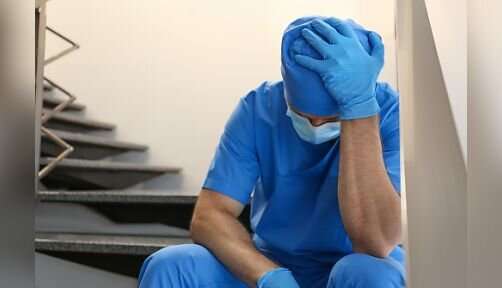Burnout, alcohol, PTSD: Health workers are suffering

A Yale School of Public Health survey of thousands of health workers suggests worrying rates of depression and post-traumatic stress disorder amid a worsening pandemic. And in their new paper, the researchers now have the numbers to prove it.
Their quantitative analysis of the survey data, which was recently published in the journal PLOS ONE, shows that nearly one quarter of all health care workers showed signs of probable PTSD, and almost one half had probable alcohol use disorder. And according to first author Rachel Hennein, an M.D./Ph.D. student at the Yale schools of medicine and public health, the results also show that there are predictive factors associated with increased risk for adverse mental health outcomes among health care workers during the pandemic.
Hennein's earlier study with the same data painted a dark picture of life in the middle of the pandemic. Workers detailed their dismay about an ineffective federal government and frustration at medical skepticism, all while remaining separated from family and friends for weeks at a time. But while that analysis captured a descriptive side of the early COVID-19 response, this new one helps to frame those voices in a statistically significant way, she said.
The result is a mosaic of data points that, taken together, can help guide efforts to improve health care workers' morale and mental health—especially as the pandemic creeps into its second year.
"Making sure supervisors are there for support, making sure problems get resolved in a fair manner and everyone's included in decision-making," she said, "could actually help health care workers with PTSD symptoms in the hospital."
Some socioeconomic factors could predict mental health disorders in the survey population, too. For example, female gender was associated with probable PTSD. Health care workers whose teams had lower cohesion were more likely to have the disorder as well. And probable general anxiety disorder was more common in those who reported having a decreased satisfaction with the federal government.
Overall, she said, the factor that was associated with the greatest mental health impact was a perceived lack of social support.
"What we need to make creative solutions around is, How do we give them more social support when they're already isolating because of their risk?" she asked. "It's a really important finding … and we really need to be creative with ways that we're able to nurture social support and social well-being among health care workers right now.
It remains to be seen how these health workers' feelings have changed as a result of the 2020 election and subsequent uptick in national unrest and COVID-19 deaths. Hennein's team conducted another survey in December and January, and they are currently examining the results.
Hennein said that she hasn't been able to take a detailed look at the recent survey results yet. But from what she's seen, positive news about vaccine production have made much of an impact. However, she explained, it's clear that more than 12 months of a deadly pandemic have taken their toll on health workers.
"Especially with the second and third waves of the pandemic during the holidays, healthcare workers are very burnt-out," she said. "It sheds light on how much we all need to be contributing to the end of COVID-19. It's not just on the health care workers. It's on the general public to wear masks, to physically distance. Otherwise, it really all falls on them."
More information: Rachel Hennein et al. Socio-ecological predictors of mental health outcomes among healthcare workers during the COVID-19 pandemic in the United States, PLOS ONE (2021). DOI: 10.1371/journal.pone.0246602



















